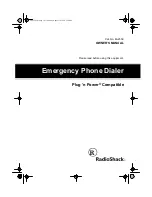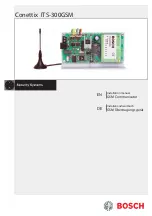
Section 3: Features
Product Description
33
3
Automatic Call Distribution operation is further enhanced by:
●
ACD Call Queuing
When all agents in an ACD Group are unavailable, an incoming call will queue and cause the
Queue Status Display to occur on the ACD Group Supervisor’s display. The display helps the
supervisor keep track of the traffic load within their group. The Queue Status Displays shows:
- The number of calls queued for an available agent in the group.
- The trunk that has been waiting the longest, and how long it has been waiting.
For each ACD Group, you can set the following conditions:
- The number of trunks that can wait in queue before the Queue Status Display occurs.
- How often the time in queue portion of the display reoccurs.
- If the supervisor should hear a Queue Alarm whenever the time in queue portion reoccurs.
This alarm is a single beep tone that reminds the supervisor to check the condition of the queue.
●
ACD Overflow (With Announcements)
ACD offers extensive overflow options for each ACD Group. For example, a caller ringing in
when all agents are unavailable can hear an initial announcement (called the 1st Announcement).
This announcement can be a general greeting like, “Thank you for calling. All of our agents are
currently busy helping other customers. Please stay on the line and we will help you shortly.” If the
caller continues to wait, you can have them hear another announcement (called the 2nd Announce-
ment) such as, “Your business is important to us. Your call will be automatically answered by the
first available agent. Please stay on the line.” If all the ACD Group’s agents still are unavailable,
the call can automatically overflow to another ACD Group or the Voice Mail Automated Atten-
dant. If all agents in the overflow ACD Group are busy, Lookback Routing automatically ensures
that the waiting call will ring into the first agent in either group that becomes free.
You can assign an ACD Group with any combination of 1st Announcement, 2nd Announcement
and overflow method. You can have, for example, a Technical Service group that plays only the
2nd Announcement to callers and then immediately overflows to Voice Mail. At the same time,
you can have a Customer Service group that plays both announcements and does not overflow.
●
Agent Log In and Log Out Services
An ACD Agent can log in and log out of their ACD Group. While logged in, the agent is available to
receive ACD Group calls. When logged out, the agent is excluded from the group’s calls. The pro-
grammable keys and alphanumeric display on an agent’s phone show at a glance when they are
logged in or logged out.
●
Emergency Call
If an ACD Agent needs assistance with a caller, they can place an Emergency Call to their ACD
Group Supervisor. Once the supervisor answers the Emergency Call, they automatically monitor
both the ACD Agent and the caller. If the agent needs assistance, the supervisor can join in the con-
versation. Emergency Call can be a big help to inexperienced ACD Agents that need technical
advise or assistance with a difficult caller. The supervisor can easily listen to the conversation and
then “jump in” if the situation gets out of hand.
●
Enhanced DSS Operation
An ACD Supervisor (Group or System) can use their DSS Console to monitor the status of the
ACD Agents within a group. The DSS Console is an essential tool for supervisors. The console key
flash rates tell the supervisor at a glance which of the group’s agents are:
- Logged onto the group (i.e., in service)
- Busy on a call
- Logged out of the group (i.e., out of service) - Placing an Emergency Call to the supervisor
- Not available or installed
The ACD Supervisor can also use their console for placing and transferring calls - just like any
other extension user.
















































